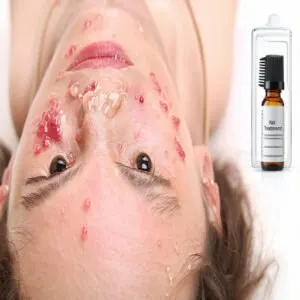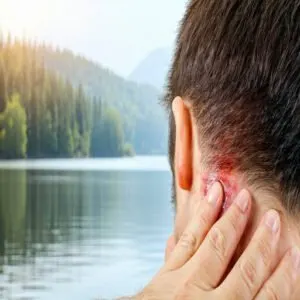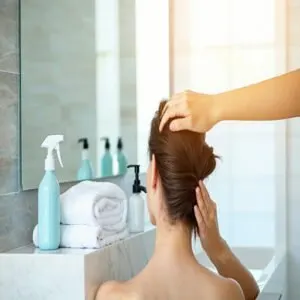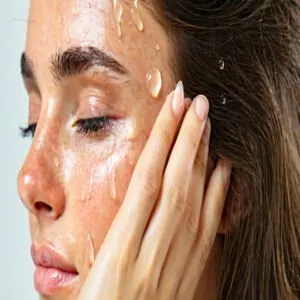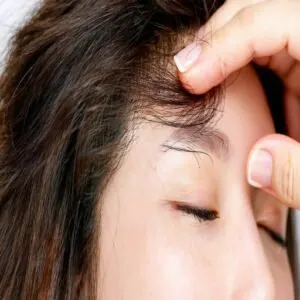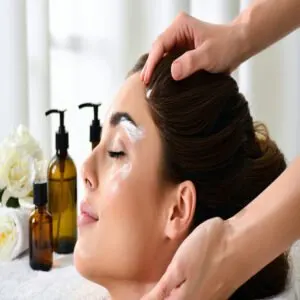This site is supported by our readers. We may earn a commission, at no cost to you, if you purchase through links.

Start by using fragrance-free, sulfate-free shampoos and lukewarm water to avoid irritation. Skip heavy treatments like full dyes—opt for root touch-ups and patch test new products first.
Environmental factors like pollution and hard water can be culprits, so try anti-pollution shampoos or use a humidifier.
For instant relief, natural remedies like aloe vera or tea tree oil work wonders. Stress plays its part too, so consider relaxation techniques.
If redness, itching, or flaking persists, it’s worth consulting a dermatologist to rule out any deeper issues.
Table Of Contents
- Key Takeaways
- Sensitive Scalp Causes
- Recognizing Scalp Sensitivity
- Gentle Hair Care Routine
- Managing Scalp Irritation
- Natural Remedies for Sensitive Scalp
- Medical Treatment Options
- Preventing Scalp Sensitivity
- Choosing Right Hair Products
- When to Seek Medical Help
- Frequently Asked Questions (FAQs)
- How do you treat sensitive scalp?
- What can be done to relieve intense itchy scalp with flaking?
- Is there a permanent cure for a sensitive scalp?
- What is a sensitive scalp?
- How can I prevent scalp tenderness?
- What are the symptoms of a sensitive scalp?
- How do you treat hypersensitive scalp?
- How do you desensitize a sensitive scalp?
- What is the best treatment for irritated scalp?
- How can I make my scalp less tender?
- Conclusion
Key Takeaways
- Use gentle, sulfate-free, and fragrance-free shampoos to reduce irritation and protect your scalp.
- Avoid harsh treatments like full hair dyes and opt for patch tests and root touch-ups instead.
- Soothe your scalp naturally with aloe vera or tea tree oil, and manage stress with relaxation techniques.
- If symptoms persist, consult a dermatologist for targeted treatments and professional advice.
Sensitive Scalp Causes
A sensitive scalp can be caused by a variety of factors like hair treatments, environmental conditions, or underlying skin issues.
Understanding these triggers helps you take the right steps to protect and soothe your scalp.
Hair Treatments and Chemicals
Chemical treatments can wreak havoc on your scalp. Hair dyes, relaxers, and perms often cause Chemical Reactions or allergic responses.
To avoid Color Damage and irritation:
- Opt for gentler hair care products like natural or ammonia-free dyes.
- Always patch-test before trying something new.
- Limit full scalp exposure—highlight or retouch roots instead.
Sensitive scalp treatment starts with careful choices!
Environmental Factors and Lifestyle
When seasonal shifts or air pollution mess with your scalp, you’re not alone.
Climate change, urban living, and even water quality can heighten sensitivity, these environmental factors demand gentle scalp care and lifestyle changes.
Stay mindful of the little things—like over-washing or hot showers—that worsen the problem, scalp sensitivity treatment thrives on consistency and prevention.
| Factor | Impact | Solution | Result |
|---|---|---|---|
| Seasonal Shifts | Dryness, flaking | Humidifier use | Moisturized scalp |
| Air Pollution | Irritation, buildup | Anti-pollution shampoos | Reduced irritation |
| Water Quality | Mineral deposits | Filtered water | Cleaner scalp surface |
| Urban Living | Stress, pollutants | Lifestyle adjustments | Enhanced scalp health |
The factors and their impacts are varied, but the key to alleviating them often involves simple lifestyle adjustments and the use of appropriate products, such as anti-pollution shampoos or humidifier use, to mitigate the effects of air pollution and seasonal shifts.
Pre-existing Scalp Conditions
Scalp conditions like dandruff, scalp eczema, and seborrheic dermatitis often cause sensitivity, leading to redness, flaking, and itchiness.
Skin allergies, fungal infections, and psoriasis symptoms can make things worse, with irritation and noticeable patches.
These issues highlight how complex scalp sensitivity treatment can be, and recognizing triggers and addressing underlying scalp conditions is key to finding relief and restoring comfort.
For effective relief, consider natural remedies that gently soothe and calm the scalp, reducing irritation and discomfort, which is essential for finding relief.
Genetic and Hormonal Factors
Sometimes, sensitive scalps run in the family.
Genetic predispositions like a family history of atopic dermatitis or scalp inheritance influence scalp sensitivity.
Hormonal changes—like pregnancy or menopause—trigger imbalances, worsening scalp issues.
Understanding sensitive scalp conditions is essential for effective treatment.
Here’s how genetics and hormones tie in:
- Hormone imbalance causes dryness.
- Scalp sensitivity causes vary with genetic testing.
- Genetics impacts scalp health.
- Hormonal shifts worsen symptoms.
- Address hereditary hair loss proactively.
Recognizing Scalp Sensitivity
You might notice symptoms like itching, redness, or a burning sensation on your scalp, but it’s not always easy to pinpoint the cause.
Recognizing these signs early can help you address potential triggers and prevent further discomfort.
Itching and Burning Sensations
Dealing with an itchy scalp or burning sensations can feel like your head’s under attack.
Common triggers include harsh products, poor rinsing, or stress.
For scalp irritation relief, opt for gentle, fragrance-free shampoos, and rinse thoroughly.
Sensitive scalp care also benefits from lukewarm water and avoiding heat styling, which aids in treating sensitive scalp early and prevents discomfort from escalating.
Redness and Flaking
Redness and flaky skin are clear signs your scalp’s irritated.
Scalp inflammation from products, weather, or pre-existing issues can make it worse. An itchy scalp often leads to scratching, which only adds to skin irritation.
For effective flaky scalp treatment and redness relief, switch to sensitive scalp care routines with sensitive scalp care and soothing, sulfate-free shampoos.
Prioritize gentle products for lasting scalp irritation relief.
Visible Signs and Symptoms
You might notice sore spots, itchy patches, or red bumps that make washing or styling uncomfortable.
Scalp inflammation can cause a tight, burning sensation, while flaky skin or redness often points to irritation or dryness.
If touching your hair triggers pain or you spot unusual swelling, don’t ignore it—these symptoms could signal something your scalp truly needs attention for, indicating potential scalp inflammation.
Gentle Hair Care Routine
Caring for a sensitive scalp starts with using gentle, fragrance-free shampoos and conditioners to avoid irritation.
Stick to sulfate-free, organic products and steer clear of harsh chemicals that can weaken and irritate your scalp.
Fragrance-Free Shampoos and Conditioners
If itching, redness, or tightness sounds familiar, it’s time to explore fragrance-free options.
Artificial scents in products can trigger irritation, making a gentle cleansing routine critical. Using a fragrance free shampoo can help alleviate these issues.
Try these steps:
- Choose a fragrancefree shampoo or sensitive scalp conditioner with hypoallergenic products.
- Look for natural ingredients like oatmeal or chamomile.
- Stick with sensitive scalp shampoo for fragrance removal and comfort.
Sulfate-Free and Organic Options
Sulfate-free shampoo and organic shampoo are staples for sensitive scalp treatment.
Sulfates can strip oils, leaving your scalp dry and irritated. Instead, opt for gentle cleansers and eco-friendly, chemical-free options.
Curious about the difference?
| Type | Benefits | Best For |
|---|---|---|
| Natural Shampoos | Gentle, no harsh chemicals | Dry, irritated scalps |
| Organic Conditioners | Nourishing, plant-based formulas | Adding moisture and repair |
| Fragrance-Free Shampoo | Reduces irritation and redness | Scent allergies |
Avoiding Harsh Hair Products
Some hair products are wolves in sheep’s clothing, packed with harsh chemicals like sulfates and parabens that irritate your sensitive scalp.
Look for gentle formulas with natural ingredients—think aloe vera or chamomile—for scalp protection.
Chemical-free options are your best friends. Swap harsh products for alternatives like organic shampoos; your scalp will thank you for ditching the drama.
Managing Scalp Irritation
Managing scalp irritation starts with small changes, like retouching roots instead of full treatments and using heat protectant sprays to shield your scalp.
These steps help reduce chemical exposure and prevent damage from styling tools, keeping your sensitive scalp more comfortable with small changes.
Retouching Roots and Highlighting
If hair coloring leaves you with an itchy, irritated scalp, techniques like Root Retouch Ups and Hair Highlighting can help minimize scalp sensitivity.
Skip full-color treatments and opt for targeted solutions that avoid excessive chemicals on delicate areas. Understanding how to prevent scalp irritation is key to a successful coloring process.
- Choose ammonia-free products to protect against irritation.
- Limit exposure by focusing on hair regrowth rather than roots.
- Always patch test first to avoid surprises like irritation or allergic reactions during color correction.
Using Heat Protectant Sprays
Highlighting and root touch-ups might limit exposure to harsh chemicals, but heat styling tools are a different story.
Using a heat protectant spray is your scalp’s best defense against irritation and hair damage.
Thermal protection creates a barrier, reducing the impact of high temperatures, and spray application is simple—mist it evenly before styling.
Hair care products like this prevent dryness, safeguard sensitive scalps, and keep your locks safe while ensuring styling product safety too.
Natural Remedies for Sensitive Scalp
You can calm your sensitive scalp naturally with simple remedies like aloe vera, tea tree oil, and gentle moisturizing treatments.
These options both soothe irritation and help restore balance to your scalp.
Aloe Vera and Tea Tree Oil
Aloe vera and tea tree oil are standout natural sensitive scalp remedies.
Aloe’s soothing hydration eases redness and itching, while tea tree’s antifungal power tackles dandruff and irritation.
For sensitive scalp care, using gentle products is essential, and these can include ingredients like aloe vera and tea tree oil.
Mix tea tree oil with a carrier oil, apply, and leave for 10 minutes.
These gentle extracts are scalp soothers that rejuvenate without harshness, making them perfect for sensitive scalp treatment, and can be found in products for sensitive scalp care.
Scalp Exfoliation and Moisturizing
Your scalp deserves TLC just like your skin.
Regular scalp exfoliation clears buildup and keeps sensitive scalps happy.
Pair it with moisturizing tips to protect and soothe.
Here’s how:
- Use gentle exfoliants or scalp masks weekly for a deep clean.
- Massage in natural oils like jojoba or coconut.
- Finish with moisturizing treatments for lasting hydration.
Stress Management Techniques
When stress feels like it’s crawling under your skin, it can aggravate scalp sensitivity.
Use calming exercises like mindful breathing or progressive muscle relaxation to lighten the load.
Stress reduction doesn’t have to be fancy—small habits count.
| Technique | Benefit | Steps |
|---|---|---|
| Mindful Breathing | Eases tension | Inhale 4 secs, exhale 6 secs |
| Gentle Yoga | Boosts emotional balance | Stretch 15–20 minutes daily |
| Meditation Breaks | Calms anxiety | 5–10 minutes during breaks |
Building emotional balance keeps your scalp healthy too.
Medical Treatment Options
When natural remedies and over-the-counter options don’t work,
medical treatments can provide effective relief for a sensitive scalp.
You may need topical corticosteroids, antifungal agents, or prescription medications,
so consulting a dermatologist is often the best step.
Topical Corticosteroids and Antifungal Agents
Scalp sensitivity can feel unbearable, but topical corticosteroids and antifungal agents offer relief.
Corticosteroid creams reduce scalp inflammation and itching caused by conditions like seborrheic dermatitis, while antifungal ointments tackle fungal infections effectively.
For sensitive scalp treatment, apply them as directed by a doctor, and consider topical corticosteroids for their ability to reduce inflammation.
These soothing options offer targeted scalp inflammation treatment without unnecessary irritation, restoring comfort and control to your everyday life.
Antibiotics and Prescription Products
For persistent scalp issues, prescription products work wonders.
These include:
- Antibiotic ointments and oral antibiotics for bacterial infections like folliculitis.
- Prescription-strength antifungal agents to fight fungal problems such as ringworm.
- Medicated shampoos or topical steroids to ease inflammation and control severe dandruff.
In some cases, addressing hair loss treatment may also be necessary to tackle underlying conditions.
Talk to a doctor for the right match based on symptoms.
Consulting a Dermatologist
If nothing’s working, it’s time to see a dermatologist.
They’ll perform scalp exams, skin testing, and assess scalp sensitivity to uncover the root cause.
A medical diagnosis can guide treatment plans, targeting underlying conditions like psoriasis or allergies.
Don’t ignore persistent symptoms—professional help guarantees proper care and protects long-term scalp health.
When in doubt, book that doctor’s visit for proper care.
Preventing Scalp Sensitivity
You can protect your scalp by avoiding common triggers like tight hairstyles, harsh products, or excessive heat styling.
Keeping your scalp clean, moisturized, and free from irritants will help prevent sensitivity and maintain its health.
Avoiding Tight Hairstyles and Excessive Heat
Tight hairstyles pull at your roots, triggering scalp sensitivity and discomfort.
Opt for hairstyle alternatives like loose buns or braids to ease tension.
Heat styling tools can fry your hairline—use heat protection sprays and limit their use.
Gentle styling and regular scalp massage can promote relaxation and circulation, giving your sensitive scalp a much-needed break while maintaining healthy hair.
Keeping The Scalp Clean and Moisturized
Healthy scalp care starts with regular, gentle cleansing and hydration, focusing on soothing scalp treatments to lock in moisture and prevent dryness.
Understanding the dry scalp causes is important for effective treatment, and using lukewarm water and sulfate-free shampoos for gentle cleansing is a good practice.
- Use sulfate-free shampoos for gentle cleansing.
- Incorporate a scalp massage to boost circulation.
- Follow up with lightweight, hydrating methods like aloe vera.
- Opt for moisturizing tips like avoiding harsh towel drying.
Consistency guarantees lasting scalp health!
Managing Stress and Allergic Reactions
Wondering if stress and anxiety are behind your sensitive scalp?
Anxiety can ramp up inflammation, so try mindful relaxation to ease tension.
Spot reaction symptoms early and consider allergy tests or skin testing to identify triggers.
Reduce exposure to stress triggers, choose gentle products, and take care of yourself—it all helps keep scalp sensitivity in check.
Choosing Right Hair Products
When your scalp feels irritated, choosing the right hair products can make all the difference.
Look for options that are gentle and fragrance-free, and specifically designed for sensitive scalps to reduce discomfort and protect your skin.
Drug-Free Shampoo and Serum Options
For a sensitive scalp, drug-free treatments like gentle cleansers and organic serums can work wonders.
Look for products with natural ingredients and herbal remedies to soothe irritation. Try options like MDhair Regrowth Shampoo for effective care.
When considering a hair regrowth product, check the hair growth ingredients to confirm they align with your scalp’s needs.
- Sulfate-free shampoos.
- Aloe vera-infused cleansers.
- Tea tree oil formulas.
- Lightweight, organic serums.
Medicated Treatments for Sensitive Scalps
Switching to drug-free options is great, but medicated treatments tackle deeper issues.
These include corticosteroid creams for inflammation or scalp injections for severe cases.
Antifungal ointments and dandruff shampoos with ketoconazole also help.
Antimicrobial shampoos keep things balanced.
Not sure what’s best? A dermatologist can recommend topical gels or treatments personalized to your sensitivity.
| Treatment Type | Use Case | Examples | Availability | Key Benefit |
|---|---|---|---|---|
| Corticosteroid Creams | Inflammation relief | Clobetasol propionate | Prescription | Reduces itching and redness |
| Antifungal Ointments | Yeast-related problems | Nizoral (ketoconazole) |
Natural Plant Treatments and Alternatives
Looking for natural remedies to calm your sensitive scalp?
There’s a world of plant-based ingredients that work wonders.
Natural soothers like aloe vera, tea tree oil, and coconut oil offer gentle scalp treatments packed with benefits:
- Aloe vera hydrates while reducing irritation.
- Tea tree oil fights bacteria and soothes itching.
- Coconut oil moisturizes and combats dryness.
When to Seek Medical Help
If your sensitive scalp symptoms are severe, persistent, or linked to issues like hair loss, it’s time to see a doctor.
A dermatologist can help pinpoint the cause and recommend effective treatments to protect both your scalp and hair health.
Persistent or Severe Symptoms
If your itchy scalp treatment hasn’t helped, or if severe itching, burning sensations, sore spots, or pus bumps persist, it’s time to think about scalp inflammation treatment.
Consistent discomfort might signal something beyond typical scalp sensitivity causes, and understanding hair growth issues can also play a role in addressing overall scalp health.
When over-the-counter scalp sensitivity remedies fail, don’t hesitate—seeing a doctor guarantees proper care and helps address stubborn symptoms safely and effectively.
Hair Loss and Suspected Underlying Conditions
Sometimes, hair loss connects to scalp sensitivity causes like autoimmune diseases, hormonal changes, or even scalp infections.
Conditions such as psoriasis, alopecia, or telogen effluvium could thin hair or lead to permanent follicle damage.
Pay attention to scalp health by noting:
- Persistent inflammation or soreness
- Unexplained hair thinning or bald spots
- Painful bumps or lesions
- Hair loss paired with other health symptoms, which could indicate a need to check for scalp sensitivity causes.
Consulting a Doctor for Personalized Advice
Seeking a doctor’s advice is essential when scalp sensitivity worsens or persists.
A dermatologist or trichologist can provide personalized care customized to your scalp health. Bring details of symptoms and health insurance for a seamless medical diagnosis.
Here’s why and when to seek care:
| Signs to Watch | Specialist to Consult | Next Steps |
|---|---|---|
| Pain or swelling persists | Dermatologist | Medical diagnosis |
| Hair loss or thinning occurs | Trichologist | Personalized treatment |
| Symptoms worsen over time | Doctor via referral | Customized scalp solutions |
This information is crucial for individuals experiencing persistent scalp issues, and consulting a doctor can lead to effective treatment and improved overall health.
Frequently Asked Questions (FAQs)
How do you treat sensitive scalp?
Think of your scalp like a delicate flower—it needs gentle care.
Use sulfate-free shampoos, moisturize regularly, avoid tight hairstyles and heat styling, and patch-test new products.
If symptoms persist, consult a dermatologist for relief.
What can be done to relieve intense itchy scalp with flaking?
Wash your hair with a gentle, sulfate-free shampoo containing zinc pyrithione or tea tree oil.
Moisturize your scalp with aloe vera.
Avoid hot water, tight hairstyles, and itchy triggers.
Consult a dermatologist if symptoms persist.
Is there a permanent cure for a sensitive scalp?
A sensitive scalp’s like having a guest that overstays—you can manage it but rarely kick it out completely.
While no permanent cure exists, gentle hair care, stress management, and consulting dermatologists can keep symptoms under control.
What is a sensitive scalp?
A sensitive scalp feels irritated and uncomfortable, showing symptoms like itching, redness, or burning.
It can happen from stress, harsh products, or conditions like eczema.
Your scalp simply reacts strongly to triggers others might tolerate.
How can I prevent scalp tenderness?
Avoid scalp tenderness by skipping tight hairstyles, reducing heat tool use, and choosing gentle, fragrance-free products.
Protect your scalp from sunburn with hats or sunscreen.
Manage stress and keep your scalp clean but not overly dry.
What are the symptoms of a sensitive scalp?
You’ll notice itching, burning, redness, or tightness, sometimes with flaking or swelling.
Touching your hair might feel painful, and bumps or dryness can appear.
Persistent irritation may even lead to dandruff, tenderness, or visible inflammation.
How do you treat hypersensitive scalp?
Treating a hypersensitive scalp means choosing gentle, sulfate-free shampoos, moisturizing deeply, and patch-testing new products.
Stick to lukewarm water, avoid tight hairstyles, and try natural remedies like aloe vera or tea tree oil for relief.
How do you desensitize a sensitive scalp?
Picture a cool breeze combing through your hair.
Desensitize your scalp by using gentle, fragrance-free shampoos, lukewarm water, scalp moisturizers, and stress management.
Avoid harsh treatments and tight hairstyles to keep irritation at bay, utilizing techniques like stress management.
What is the best treatment for irritated scalp?
Soothe your irritated scalp by switching to a mild, fragrance-free shampoo, using lukewarm water, and avoiding tight hairstyles.
Try aloe vera or tea tree oil, reduce stress, and consult a dermatologist if symptoms persist or worsen.
How can I make my scalp less tender?
Ever feel like your scalp’s throwing a tantrum?
Ease that tenderness with a sulfate-free shampoo, gentle scalp massages, and avoiding tight hairstyles.
Moisturize with aloe vera or tea tree oil, and skip harsh chemicals altogether.
Conclusion
Caring for a sensitive scalp is like tending to a delicate garden—it needs the right tools and a gentle touch.
Identifying triggers, whether it’s harsh products, stress, or environmental factors, is your starting point.
Swap out irritants for fragrance-free, sulfate-free shampoos and natural remedies like aloe vera.
Don’t ignore persistent symptoms; a dermatologist can offer personalized solutions.
With thoughtful care, a healthier, happier scalp is within reach. Follow these sensitive scalp treatment advice tips for lasting relief.
- https://www.medicalnewstoday.com/articles/313791
- https://www.babobotanicals.com/blogs/news/sensitive-scalp
- https://www.byrdie.com/sensitive-scalp-explainer-7254748
- https://www.headandshoulders.co.in/en-in/healthy-hair-and-scalp/scalp/sensitive-scalp-remedy-and-treatments
- https://www.webmd.com/skin-problems-and-treatments/sensitive-scalp

